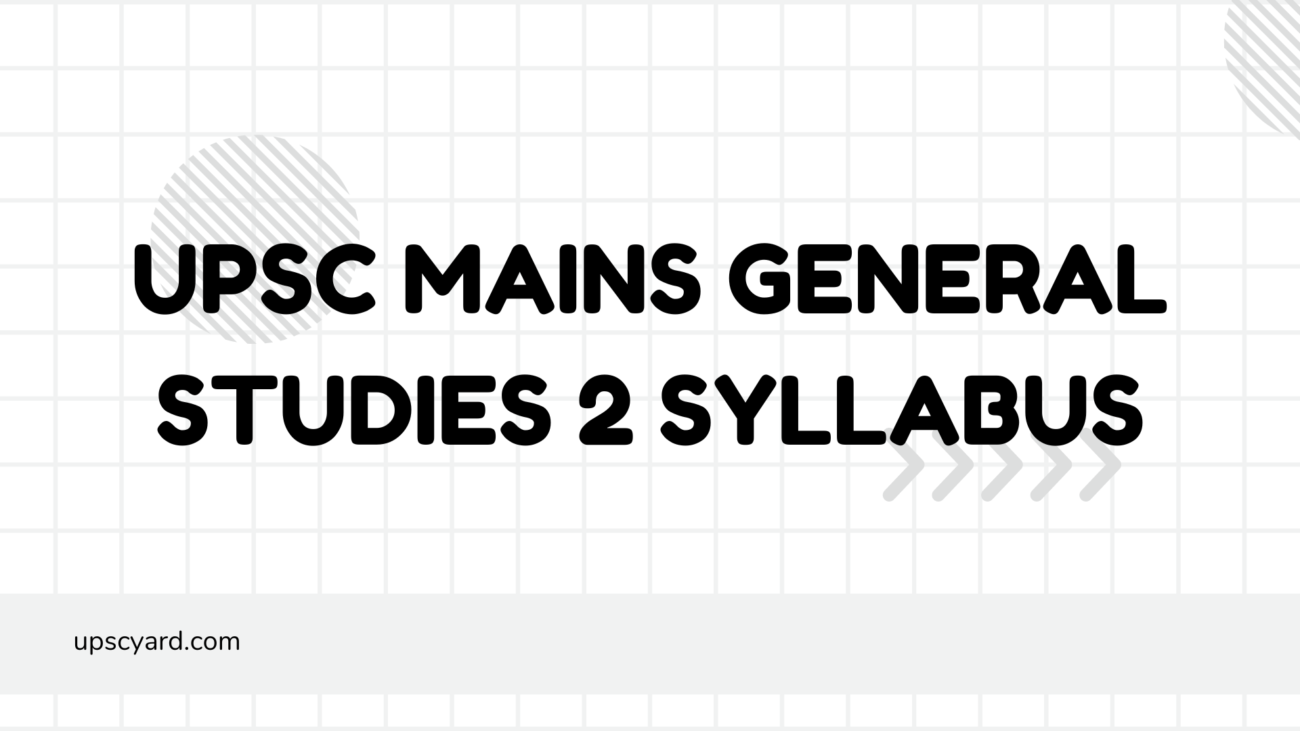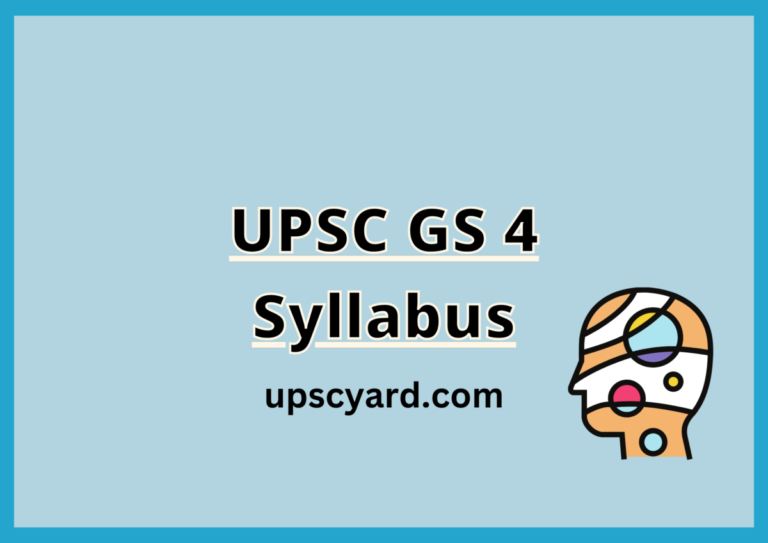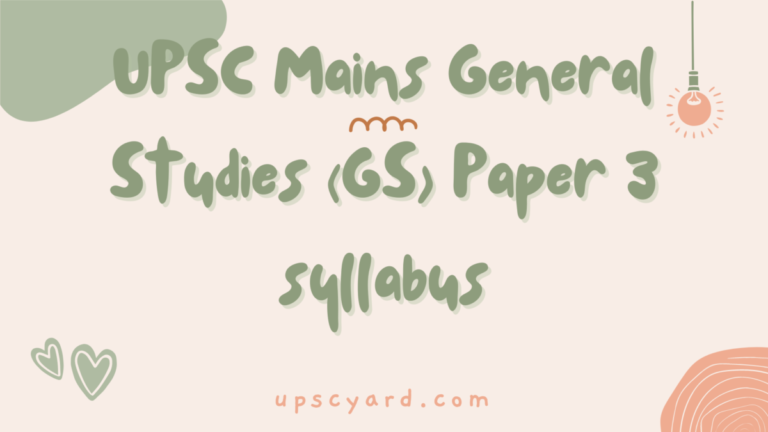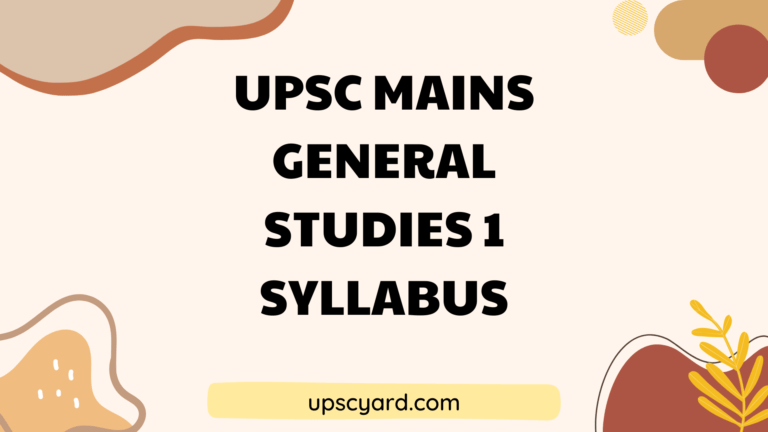UPSC CSE MAINS General Studies GS 2 Syllabus
General Studies- II: Governance, Constitution, Polity, Social Justice and International relations.
UPSC CSE MAINS General Studies GS 2 Syllabus
- Indian Constitution—historical underpinnings, evolution, features, amendments, significant provisions and basic structure.
- Functions and responsibilities of the Union and the States, issues and challenges pertaining to the federal structure, devolution of powers and finances up to local levels and challenges therein.
- Separation of powers between various organs dispute redressal mechanisms and institutions.
- Comparison of the Indian constitutional scheme with that of other countries.
- Parliament and State legislatures—structure, functioning, conduct of business, powers & privileges and issues arising out of these.
- Structure, organization and functioning of the Executive and the Judiciary—Ministries and Departments of the Government; pressure groups and formal/informal associations and their role in the Polity.
- Salient features of the Representation of People’s Act.
- Appointment to various Constitutional posts, powers, functions and responsibilities of various Constitutional Bodies.
- Statutory, regulatory and various quasi-judicial bodies.
- Government policies and interventions for development in various sectors and issues arising out of their design and implementation.
- Development processes and the development industry —the role of NGOs, SHGs, various groups and associations, donors, charities, institutional and other stakeholders.
- Welfare schemes for vulnerable sections of the population by the Centre and States and the
- performance of these schemes; mechanisms, laws, institutions and Bodies constituted for the protection and betterment of these vulnerable sections.
- Issues relating to development and management of Social Sector/Services relating to Health , Education, Human Resources.
- Issues relating to poverty and hunger.
- Important aspects of governance, transparency and accountability, e-governance- applications, models,successes, limitations, and potential; citizens charters, transparency & accountability and institutional and other measures.
- Role of civil services in a democracy.
- India and its neighbourhood- relations.
- Bilateral, regional and global groupings and agreements involving India and/or affecting India’s interests.
- Effect of policies and politics of developed and developing countries on India’s interests, Indian diaspora.
- Important International institutions, agencies and fora- their structure, mandate.
PATTERN
THE NUMBER OF QUESTIONS & THEIR ASSOCIATED WEIGHTAGE MARKS MAY DIFFERENTIATE AS PER THE EXAMINER’S OR COMMISSION’S DECISION ( IN A NUTSHELL, WE CAN’T ASSUME WHAT & HOW THEY WOULD SURPRISE US IN THE EXAM ROOM )
PER THE CURRENT TREND, THERE ARE 20 COMPULSORY QUESTIONS PRINTED IN HINDI AND ENGLISH WHICH ARE TO BE ANSWERED IN THE LANGUAGE SELECTED WHILE FILLING OUT THE APPLICATION FORM. QUESTIONS THAT ARE RESPONDED TO IN ANY OTHER LANGUAGE ARE NOT EVALUATED.
THE PAPER IS OF A TOTAL OF 250 MARKS. (FIXED)
THE WORD LIMIT FOR 10 MARKS QUESTIONS IS 150, AND FOR 15 MARKS IS 250. (IT CAN VARY, NOT SURE, JUST TAKE IT AS A SURPRISE )
Detailed UPSC CSE MAINS General Studies GS 2 Syllabus
Indian Constitution
- Regulating Act (1773) to Independence Act (1947)
- Constituent Assembly
- Objective Resolution
- Enactment & Enforcement of Constitution
- Features ( written , rigid or flexible , federal or unitary )
- List of Significant Amendments & Their Provisions
- Procedure for Amending Constitution
- Due Process of Law vs. Procedure Established by Law.
- Citizenship
- Judgments & Cases ( Golaknath case, Kesavananda Bharati, Indira Gandhi Vs Raj Narain, Ram Jawaya vs Punjab )
- Fundamental Rights
- Directive Principles of State Policy
- Judicial Review
- Universal Adult Franchise
- Single Citizenship
- Separation of Powers
- Functions & Responsibilities of the Union and the States ( 7th schedule , Administrative & Quasi-Judicial Functions )
- Cooperative & Competitive Federalism
- Centre-State Relations
- Inter-State Relations ( Inter-State Trade and Commerce , Zonal Councils )
- Emergency Provisions
- Role of Governor
- Reports of Various Commissions ( Sarkaria commission , 2nd ARC )
- 11th & 12th Schedule
- Doctrine of Separation of Power , Doctrine of Checks & Balances
- RTI
- PIL , Tribunals .
- President / governor , prime minister / chief minister , council of ministers .
- Chief Justice of India
- SC & HC Judges
- Pressure Groups & Interest Groups
- Election Commission
- Union Public Service Commission
- State Public Service Commission
- Finance Commission
- National Commission for SCs
- National Commission for STs
- Special Officer for Linguistic Minorities
- Comptroller and Auditor General of India
- Attorney General of India
- Advocate General of the State
- Statutory, Regulatory & Quasi-Judicial Bodies
- NITI Aayog
- RBI
- National Human Rights Commission
- State Human Rights Commission
- Central Information Commission
- Central Vigilance Commission
- Central Bureau of Investigation
- Lokpal and Lokayuktas
- National Commission for Women
- National Commission for Backward Classes
- National Commission for Minorities
- Securities and Exchange Board of India
- Competition Commission of India
- National Green Tribunal
GOVERNANCE
- Statutory, regulatory and various quasi-judicial bodies
- Government policies and interventions for the development of various sectors (Health, Gender, Education, Poverty, Economic)
- Beti Bachao Beti Padhao
- Smart City
- Swachh Bharat Abhiyan
- MGNERGA
- Digital India
- Make in India
- Skill India
- PM Jan Dhan Yojana
- Start-up India etc.
- Role and Impact of Non-governmental Organizations ( Issue Areas: Accreditation, Legitimacy & Accountability, Foreign Funding )
- Societies, Trusts and Cooperatives (National Policy on Co-operatives, 2002)
- Dimensions of Governance.
- E-Governance
- Means to ensure Transparency & Accountability
- RTI
- Social Audit
- Whistleblower Protection Bill
- Lokpal & Lokayuktas Act
- Relationship Between Civil Service And Democracy
SOCIAL JUSTICE
- Schemes for the Following Vulnerable Sections
- Sc’s
- The Protection of Civil Rights Act
- The Scheduled Castes and the Scheduled Tribes (Prevention of Atrocities) Act
- STs:
- TRIFED
- Scheduled Tribes and Other Traditional Forest Dwellers (Recognition of Forest Rights) Act
- Women & Children
- The Immoral Traffic (Prevention) Act
- The Indecent Representation of Women (Prevention) Act
- The Dowry Prohibition Act
- The Protection of Children from Sexual Offences (POCSO) Act
- Sexual Harassment of Women at Workplace (Prevention, Prohibition and Redressal)
- Pre-Conception and Pre Natal Diagnostic Techniques (PC&PNDT) Act
- Gender Budgeting
- Maternity Benefit (Amendment) Act
- Health
- National Health Policy
- National Health Mission
- 12th FYP Strategy
- Education
- ASER Report
- Subramanian Panel Report
- Human Resource
- Skill Development Initiatives
- Poverty & Hunger
- MDGs & SDGs
- Sc’s
INTERNATIONAL RELATIONS
- India and its Neighborhood – Relations
- Regional & Global Groupings
- SAARC
- BRICS
- BBIN & BCIM
- BIMSTEC
- IBSA
- ASEAN & RCEP
- India-Africa Forum
- SCO
- Ashgabat Agreement
- FIPIC
- IOR-ARC
- Mekong Ganga Cooperation (MGC)
- Raisina Dialogue
- Heart of Asia Conference
- East Asia Summit
- G-20
- Asian Development Bank
- National Security Summit
- Multilateral Nuclear Export Regulatory Regimes: Wassenar, MTCR, Australia Group
- Asian Development Bank
- APEC
- Effect of Policies & Politics of Developed & Developing Countries on India’s Interests
- One Belt One Road
- International North–South Transport Corridor
- Global Trade War
- Global Currency War
- UN Reforms
- WTO Reforms
- South China Sea Conflict
- Brexit
- Deglobalisation & Protectionism – US Sanctions on Iran, H-1B Visa Issue etc.
- OPEC Oil Prices
- Indian Diaspora
- OCI
- Pravasi Bharatiya Divas
- LM Singhvi High Level Committee on the Diaspora
- Important International Institutions
- WTO
- World Bank
- MF
- World Economic Forum
- UN




